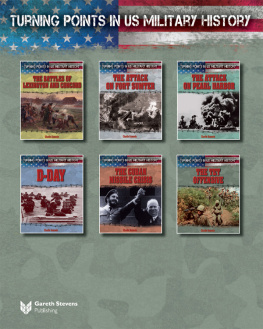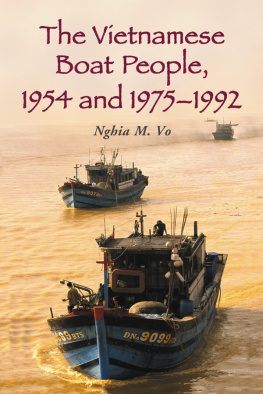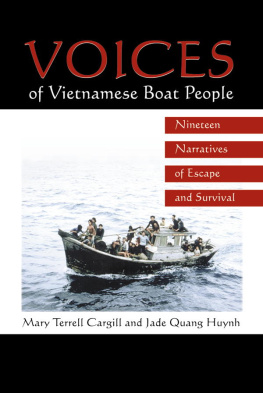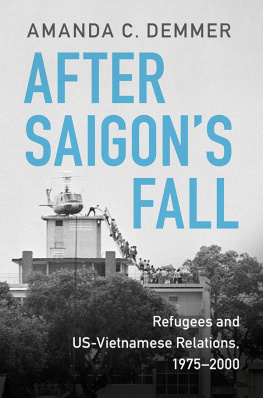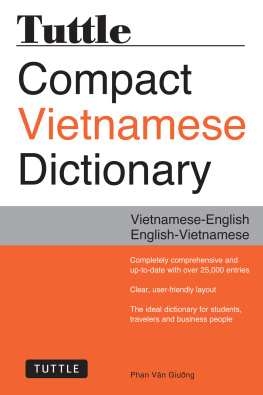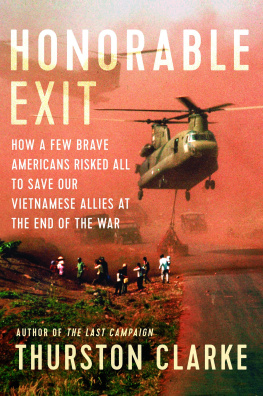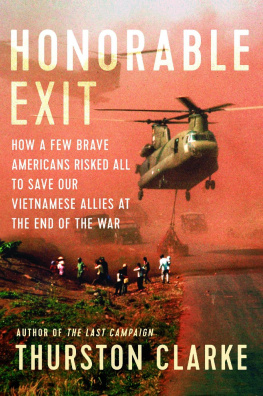Tears Before the Rain
TEARS BEFORE THE RAIN
An Oral History of the Fall of South Vietnam
LARRY ENGELMANN

Oxford University Press
Oxford New York Toronto
Delhi Bombay Calcutta Madras Karachi
Petaling Jaya Singapore Hong Kong Tokyo
Nairobi Dar es Salaam Cape Town
Melbourne Auckland
and associated companies in
Berlin Ibadan
Copyright 1990 by Larry Engelmann
Published by Oxford University Press, Inc.,
200 Madison Avenue, New York, New York 10016
Oxford is a registered trademark of Oxford University Press
All rights reserved. No part of this publication may be reproduced,
stored in a retrieval system, or transmitted, in any form or by any means,
electronic, mechanical, photocopying, recording, or otherwise,
without prior permission of Oxford University Press.
Library of Congress Cataloging-in-Publication Data
Engelmann, Larry.
Tears before the rain : an oral history of
the fall of South Vietnam
Larry Engelmann.
p. cm. ISBN 0-19-505386-9
1. Vietnamese Conflict, 1961-1975Personal narratives.
I. Title. DS559.5.E45 1990 959.70438-dc20
89-26629
9 8 7 6 5 4 3 2 1
Printed in the United States of America
on acid-free paper
For My Mother
Delores Barnett
I dont want my memories to be lost, like tears in the rain. So I will tell you my story. Then you can tell it to others. Maybe if enough people know what happened to Vietnam, then my memories will never be lost. Maybe then they will be like tears before the rain. So listen. This is very important. This is what I remember. This is what happened to me. These are my tears before the rain.
Duong Gang Son
Preface
During the last days of January in 1975 an unusually large swarm of bees descended on Saigon, the embattled capital of South Vietnam. The bees settled on two small apartment buildings. The terrified inhabitants of the buildings ran away. A few dauntless residents, however, soon returned to assail the swarm. They decided to use smoke to dislodge the bees.
But before the smoke was used, other people who had heard about the bees suggested that they had been sent to Saigon to convey a warning. The many seers and mystics of the city who were adept at deciphering fantastic and arcane phenomena announced that the arrival of the bees indicated that in a short time the Vietnamese people themselves would be like the bees. And as we treat them, the mystics and seers said, so will we in turn be treated.
The conviction that the bees were a sign gained popular acceptance quickly. No smoke was used to dislodge them. From around the city people came to gaze at them and to wonder. No one entered the buildings. And then, only a day after they had first appeared in Saigon, the bees departed. They fled to the southeast in the direction of Vung Tau and the South China Sea. And although no one could say for sure what was meant specifically by the revelation that the people of Vietnam would be like the bees, many people wondered and worried more than ever about the future.
Only a few days after the bees abandoned Saigon, another unusual swarm appeared; this time near Phan Rang, northeast of Saigon. A vast army of caterpillars materialized, seemingly out of nowhere, and migrated to the southwest, blanketing the roads and fields. At first cars and cyclists simply drove over them and people walked on them. They were nothing more than a nuisance. But once again the mystics cautioned that the caterpillars should be regarded as a divine omen and should not be harmed. Soon we shall surely be like the caterpillars, they warned, and as we treat them, so in turn will we be treated. Then, like the bees, the caterpillars disappeared.
By the time the bees and caterpillars had appeared, South Vietnam was engaged in the second year of what President Nguyen Van Thieu termed the Third Indochina War. In that war the armed forces of South Vietnam continued to fight against the insurgent Viet Cong and their North Vietnamese allies. But missing from the conflict was the United States. More than a decade earlier President John F. Kennedy had talked about making power credible and defending freedom and had concluded that Vietnam is the place to do both. In 1973, however, the American people and their leaders had decided that Vietnam was not the place. No more Americans should die for Vietnam, they decreed.
And so, early in 1973, after more than four years of negotiation in Paris, the United States finally came to terms with North Vietnam and signed what was called An Agreement on Ending the War and Restoring the Peace in Vietnam. South Vietnam signed the agreement only reluctantly and after prolonged pressure and threats of an aid cutoff from the United States. The agreement provided for the disengagement and withdrawal of American combat forces from South Vietnam and an exchange of all prisoners of war. It also provided joint commissions for monitoring the release of prisoners and the withdrawal of American and other non-Vietnamese troops from South Vietnam. A four-party international commission was charged with supervising the cease-fire that was expected to follow the signing of the Paris Agreement and investigating violations of it. Another joint military commission was established by the agreement to investigate the whereabouts of American (missing in action). The agreement also anticipated establishment of a council to facilitate the peaceful reunification of North and South Vietnam.
The only part of the treaty that was actually strictly adhered to was that requiring the withdrawal of American forces. On March 29, 1973, the last American combat troops withdrew from South Vietnam. The old (Military Assistance Command, Vietnam) headquarters at Tan Son Nhut air base became the home of the American Defense Attach Office (DAO), which was strictly limited to monitoring the flow, distribution, and use of American supplies to the South Vietnamese military. The DAO staff was forbidden to assume any military advisory role in South Vietnam.
In one of its most controversial clauses, the Paris Agreement allowed the North Vietnamese to maintain somewhere between 80,000 and 160,000 combat troops in South Vietnam. For that reason alone, many South Vietnamese recognized the agreement, not as a peace treaty, but as a death sentence for their nation. According to the agreement, the North Vietnamese troops could be maintained, but not expanded; they could be supplied and replaced, but not reinforced beyond their existing numbers. In order to assuage the misgivings and the fears of the South Vietnamese, who were asked to coexist peacefully with this North Vietnamese military presence, both President Richard M. Nixon and Henry Kissinger, who personally negotiated the agreement, assured the South Vietnamese that the United States would never stand aside and allow North Vietnam to violate the treaty and expand its presence within South Vietnam. In fact, they promised President Thieu that the United States would respond with decisive military force to any gross violations of the treaty by the North. The military might of America, they assured him, would protect the territorial integrity and political independence of our ally. Soon after he took office in the summer of 1974, President Gerald Ford reaffirmed Americas commitment to South Vietnam and the Paris Agreement.
Yet, in the end, the pledges of the two American presidents proved empty. The passage of time brought new problems and new leadership to the United States. The Watergate scandal brought first the discrediting and then the resignation of President Nixon and a weakening of the executive branch of the government. For Vietnam this was ominous, since support for South Vietnam had been centered in the executive branch while opposition to support for South Vietnam was centered in the legislative branch. A war in the Middle East and an oil squeeze by OPEC (Organization of Petroleum Exporting Countries) brought rapidly risingprices and a concern for Americas ability to maintain its commitments to allied nations in areas outside Southeast Asia.
Next page

